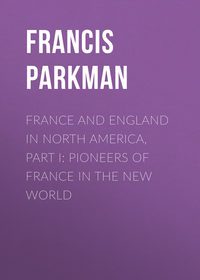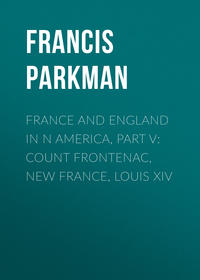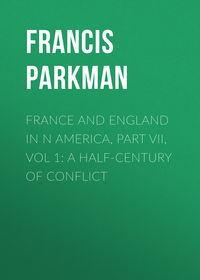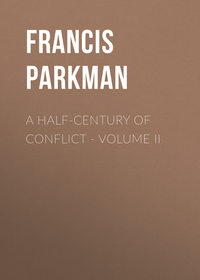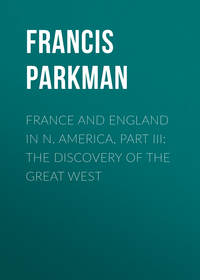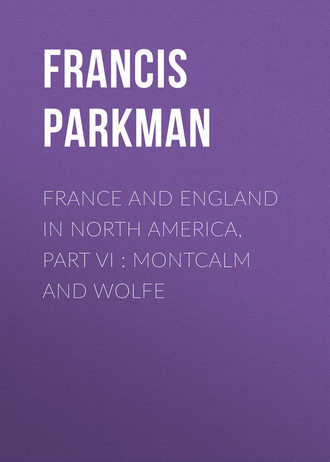 полная версия
полная версияFrance and England in North America, Part VI : Montcalm and Wolfe
Eastward, beyond the Rhine, lay the heterogeneous patchwork of the Holy Roman, or Germanic, Empire. The sacred bonds that throughout the Middle Ages had held together its innumerable fragments, had lost their strength. The Empire decayed as a whole; but not so the parts that composed it. In the south the House of Austria reigned over a formidable assemblage of states; and in the north the House of Brandenburg, promoted to royalty half a century before, had raised Prussia into an importance far beyond her extent and population. In her dissevered rags of territory lay the destinies of Germany. It was the late King, that honest, thrifty, dogged, headstrong despot, Frederic William, who had made his kingdom what it was, trained it to the perfection of drill, and left it to his son, Frederic II. the best engine of war in Europe. Frederic himself had passed between the upper and nether millstones of paternal discipline. Never did prince undergo such an apprenticeship. His father set him to the work of an overseer, or steward, flung plates at his head in the family circle, thrashed him with his rattan in public, bullied him for submitting to such treatment, and imprisoned him for trying to run away from it. He came at last out of purgatory; and Europe felt him to her farthest bounds. This bookish, philosophizing, verse-making cynic and profligate was soon to approve himself the first warrior of his time, and one of the first of all time.
Another power had lately risen on the European world. Peter the Great, half hero, half savage, had roused the inert barbarism of Russia into a titanic life. His daughter Elizabeth had succeeded to his throne,—heiress of his sensuality, if not of his talents.
Over all the Continent the aspect of the times was the same. Power had everywhere left the plains and the lower slopes, and gathered at the summits. Popular life was at a stand. No great idea stirred the nations to their depths. The religious convulsions of the sixteenth and seventeenth centuries were over, and the earthquake of the French Revolution had not begun. At the middle of the eighteenth century the history of Europe turned on the balance of power; the observance of treaties; inheritance and succession; rivalries of sovereign houses struggling to win power or keep it, encroach on neighbors, or prevent neighbors from encroaching; bargains, intrigue, force, diplomacy, and the musket, in the interest not of peoples but of rulers. Princes, great and small, brooded over some real or fancied wrong, nursed some dubious claim born of a marriage, a will, or an ancient covenant fished out of the abyss of time, and watched their moment to make it good. The general opportunity came when, in 1740, the Emperor Charles VI. died and bequeathed his personal dominions of the House of Austria to his daughter, Maria Theresa. The chief Powers of Europe had been pledged in advance to sustain the will; and pending the event, the veteran Prince Eugene had said that two hundred thousand soldiers would be worth all their guaranties together. The two hundred thousand were not there, and not a sovereign kept his word. They flocked to share the spoil, and parcel out the motley heritage of the young Queen. Frederic of Prussia led the way, invaded her province of Silesia, seized it, and kept it. The Elector of Bavaria and the King of Spain claimed their share, and the Elector of Saxony and the King of Sardinia prepared to follow the example. France took part with Bavaria, and intrigued to set the imperial crown on the head of the Elector, thinking to ruin her old enemy, the House of Austria, and rule Germany through an emperor too weak to dispense with her support. England, jealous of her designs, trembling for the balance of power, and anxious for the Hanoverian possessions of her king, threw herself into the strife on the side of Austria. It was now that, in the Diet at Presburg, the beautiful and distressed Queen, her infant in her arms, made her memorable appeal to the wild chivalry of her Hungarian nobles; and, clashing their swords, they shouted with one voice: "Let us die for our king, Maria Theresa;" Moriamur pro rege nostro, Mariâ Theresiâ,—one of the most dramatic scenes in history; not quite true, perhaps, but near the truth. Then came that confusion worse confounded called the war of the Austrian Succession, with its Mollwitz, its Dettingen, its Fontenoy, and its Scotch episode of Culloden. The peace of Aix-la-Chapelle closed the strife in 1748. Europe had time to breathe; but the germs of discord remained alive.
The American CombatantsThe French claimed all America, from the Alleghanies to the Rocky Mountains, and from Mexico and Florida to the North Pole, except only the ill-defined possessions of the English on the borders of Hudson Bay; and to these vast regions, with adjacent islands, they gave the general name of New France. They controlled the highways of the continent, for they held its two great rivers. First, they had seized the St. Lawrence, and then planted themselves at the mouth of the Mississippi. Canada at the north, and Louisiana at the south, were the keys of a boundless interior, rich with incalculable possibilities. The English colonies, ranged along the Atlantic coast, had no royal road to the great inland, and were, in a manner, shut between the mountains and the sea. At the middle of the century they numbered in all, from Georgia to Maine, about eleven hundred and sixty thousand white inhabitants. By the census of 1754 Canada had but fifty-five thousand.1 Add those of Louisiana and Acadia, and the whole white population under the French flag might be something more than eighty thousand. Here is an enormous disparity; and hence it has been argued that the success of the English colonies and the failure of the French was not due to difference of religious and political systems, but simply to numerical preponderance. But this preponderance itself grew out of a difference of systems. We have said before, and it cannot be said too often, that in making Canada a citadel of the state religion,—a holy of holies of exclusive Roman Catholic orthodoxy,—the clerical monitors of the Crown robbed their country of a trans-Atlantic empire. New France could not grow with a priest on guard at the gate to let in none but such as pleased him. One of the ablest of Canadian governors, La Galissonière, seeing the feebleness of the colony compared with the vastness of its claims, advised the King to send ten thousand peasants to occupy the valley of the Ohio, and hold back the British swarm that was just then pushing its advance-guard over the Alleghanies. It needed no effort of the King to people his waste domain, not with ten thousand peasants, but with twenty times ten thousand Frenchmen of every station,—the most industrious, most instructed, most disciplined by adversity and capable of self-rule, that the country could boast. While La Galissonière was asking for colonists, the agents of the Crown, set on by priestly fanaticism, or designing selfishness masked with fanaticism, were pouring volleys of musketry into Huguenot congregations, imprisoning for life those innocent of all but their faith,—the men in the galleys, the women in the pestiferous dungeons of Aigues Mortes,—hanging their ministers, kidnapping their children, and reviving, in short, the dragonnades. Now, as in the past century, many of the victims escaped to the British colonies, and became a part of them. The Huguenots would have hailed as a boon the permission to emigrate under the fleur-de-lis, and build up a Protestant France in the valleys of the West. It would have been a bane of absolutism, but a national glory; would have set bounds to English colonization, and changed the face of the continent. The opportunity was spurned. The dominant Church clung to its policy of rule and ruin. France built its best colony on a principle of exclusion, and failed; England reversed the system, and succeeded.
I have shown elsewhere the aspects of Canada, where a rigid scion of the old European tree was set to grow in the wilderness. The military Governor, holding his miniature Court on the rock of Quebec; the feudal proprietors, whose domains lined the shores of the St. Lawrence; the peasant; the roving bushranger; the half-tamed savage, with crucifix and scalping-knife; priests; friars; nuns; and soldiers,—mingled to form a society the most picturesque on the continent. What distinguished it from the France that produced it was a total absence of revolt against the laws of its being,—an absolute conservatism, an unquestioning acceptance of Church and King. The Canadian, ignorant of everything but what the priest saw fit to teach him, had never heard of Voltaire; and if he had known him, would have thought him a devil. He had, it is true, a spirit of insubordination born of the freedom of the forest; but if his instincts rebelled, his mind and soul were passively submissive. The unchecked control of a hierarchy robbed him of the independence of intellect and character, without which, under the conditions of modern life, a people must resign itself to a position of inferiority. Yet Canada had a vigor of her own. It was not in spiritual deference only that she differed from the country of her birth. Whatever she had caught of its corruptions, she had caught nothing of its effeminacy. The mass of her people lived in a rude poverty,—not abject, like the peasant of old France, nor ground down by the tax-gatherer; while those of the higher ranks—all more or less engaged in pursuits of war or adventure, and inured to rough journeyings and forest exposures—were rugged as their climate. Even the French regular troops, sent out to defend the colony, caught its hardy spirit, and set an example of stubborn fighting which their comrades at home did not always emulate.
Canada lay ensconced behind rocks and forests. All along her southern boundaries, between her and her English foes, lay a broad tract of wilderness, shaggy with primeval woods. Innumerable streams gurgled beneath their shadows; innumerable lakes gleamed in the fiery sunsets; innumerable mountains bared their rocky foreheads to the wind. These wastes were ranged by her savage allies, Micmacs, Etechémins, Abenakis, Caughnawagas; and no enemy could steal upon her unawares. Through the midst of them stretched Lake Champlain, pointing straight to the heart of the British settlements,—a watery thoroughfare of mutual attack, and the only approach by which, without a long détour by wilderness or sea, a hostile army could come within striking distance of the colony. The French advanced post of Fort Frederic, called Crown Point by the English, barred the narrows of the lake, which thence spread northward to the portals of Canada guarded by Fort St. Jean. Southwestward, some fourteen hundred miles as a bird flies, and twice as far by the practicable routes of travel, was Louisiana, the second of the two heads of New France; while between lay the realms of solitude where the Mississippi rolled its sullen tide, and the Ohio wound its belt of silver through the verdant woodlands.
To whom belonged this world of prairies and forests? France claimed it by right of discovery and occupation. It was her explorers who, after De Soto, first set foot on it. The question of right, it is true, mattered little; for, right or wrong, neither claimant would yield her pretensions so long as she had strength to uphold them; yet one point is worth a moment's notice. The French had established an excellent system in the distribution of their American lands. Whoever received a grant from the Crown was required to improve it, and this within reasonable time. If he did not, the land ceased to be his, and was given to another more able or industrious. An international extension of her own principle would have destroyed the pretensions of France to all the countries of the West. She had called them hers for three fourths of a century, and they were still a howling waste, yielding nothing to civilization but beaver-skins, with here and there a fort, trading-post, or mission, and three or four puny hamlets by the Mississippi and the Detroit. We have seen how she might have made for herself an indisputable title, and peopled the solitudes with a host to maintain it. She would not; others were at hand who both would and could; and the late claimant, disinherited and forlorn, would soon be left to count the cost of her bigotry.
The thirteen British colonies were alike, insomuch as they all had representative governments, and a basis of English law. But the differences among them were great. Some were purely English; others were made up of various races, though the Anglo-Saxon was always predominant. Some had one prevailing religious creed; others had many creeds. Some had charters, and some had not. In most cases the governor was appointed by the Crown; in Pennsylvania and Maryland he was appointed by a feudal proprietor, and in Connecticut and Rhode Island he was chosen by the people. The differences of disposition and character were still greater than those of form.
The four northern colonies, known collectively as New England, were an exception to the general rule of diversity. The smallest, Rhode Island, had features all its own; but the rest were substantially one in nature and origin. The principal among them, Massachusetts, may serve as the type of all. It was a mosaic of little village republics, firmly cemented together, and formed into a single body politic through representatives sent to the "General Court" at Boston. Its government, originally theocratic, now tended to democracy, ballasted as yet by strong traditions of respect for established worth and ability, as well as by the influence of certain families prominent in affairs for generations. Yet there were no distinct class-lines, and popular power, like popular education, was widely diffused. Practically Massachusetts was almost independent of the mother-country. Its people were purely English, of sound yeoman stock, with an abundant leaven drawn from the best of the Puritan gentry; but their original character had been somewhat modified by changed conditions of life. A harsh and exacting creed, with its stiff formalism and its prohibition of wholesome recreation; excess in the pursuit of gain,—the only resource left to energies robbed of their natural play; the struggle for existence on a hard and barren soil; and the isolation of a narrow village life,—joined to produce, in the meaner sort, qualities which were unpleasant, and sometimes repulsive. Puritanism was not an unmixed blessing. Its view of human nature was dark, and its attitude towards it one of repression. It strove to crush out not only what is evil, but much that is innocent and salutary. Human nature so treated will take its revenge, and for every vice that it loses find another instead. Nevertheless, while New England Puritanism bore its peculiar crop of faults, it produced also many good and sound fruits. An uncommon vigor, joined to the hardy virtues of a masculine race, marked the New England type. The sinews, it is true, were hardened at the expense of blood and flesh,—and this literally as well as figuratively; but the staple of character was a sturdy conscientiousness, an undespairing courage, patriotism, public spirit, sagacity, and a strong good sense. A great change, both for better and for worse, has since come over it, due largely to reaction against the unnatural rigors of the past. That mixture, which is now too common, of cool emotions with excitable brains, was then rarely seen. The New England colonies abounded in high examples of public and private virtue, though not always under the most prepossessing forms. They were conspicuous, moreover, for intellectual activity, and were by no means without intellectual eminence. Massachusetts had produced at least two men whose fame had crossed the sea,—Edwards, who out of the grim theology of Calvin mounted to sublime heights of mystical speculation; and Franklin, famous already by his discoveries in electricity. On the other hand, there were few genuine New Englanders who, however personally modest, could divest themselves of the notion that they belonged to a people in an especial manner the object of divine approval; and this self-righteousness, along with certain other traits, failed to commend the Puritan colonies to the favor of their fellows. Then, as now, New England was best known to her neighbors by her worst side.
In one point, however, she found general applause. She was regarded as the most military among the British colonies. This reputation was well founded, and is easily explained. More than all the rest, she lay open to attack. The long waving line of the New England border, with its lonely hamlets and scattered farms, extended from the Kennebec to beyond the Connecticut, and was everywhere vulnerable to the guns and tomahawks of the neighboring French and their savage allies. The colonies towards the south had thus far been safe from danger. New York alone was within striking distance of the Canadian war-parties. That province then consisted of a line of settlements up the Hudson and the Mohawk, and was little exposed to attack except at its northern end, which was guarded by the fortified town of Albany, with its outlying posts, and by the friendly and warlike Mohawks, whose "castles" were close at hand. Thus New England had borne the heaviest brunt of the preceding wars, not only by the forest, but also by the sea; for the French of Acadia and Cape Breton confronted her coast, and she was often at blows with them. Fighting had been a necessity with her, and she had met the emergency after a method extremely defective, but the best that circumstances would permit. Having no trained officers and no disciplined soldiers, and being too poor to maintain either, she borrowed her warriors from the workshop and the plough, and officered them with lawyers, merchants, mechanics, or farmers. To compare them with good regular troops would be folly; but they did, on the whole, better than could have been expected, and in the last war achieved the brilliant success of the capture of Louisburg. This exploit, due partly to native hardihood and partly to good luck, greatly enhanced the military repute of New England, or rather was one of the chief sources of it.
The great colony of Virginia stood in strong contrast to New England. In both the population was English; but the one was Puritan with Roundhead traditions, and the other, so far as concerned its governing class, Anglican with Cavalier traditions. In the one, every man, woman, and child could read and write; in the other, Sir William Berkeley once thanked God that there were no free schools, and no prospect of any for a century. The hope had found fruition. The lower classes of Virginia were as untaught as the warmest friend of popular ignorance could wish. New England had a native literature more than respectable under the circumstances, while Virginia had none; numerous industries, while Virginia was all agriculture, with but a single crop; a homogeneous society and a democratic spirit, while her rival was an aristocracy. Virginian society was distinctively stratified. On the lowest level were the negro slaves, nearly as numerous as all the rest together; next, the indented servants and the poor whites, of low origin, good-humored, but boisterous, and sometimes vicious; next, the small and despised class of tradesmen and mechanics; next, the farmers and lesser planters, who were mainly of good English stock, and who merged insensibly into the ruling class of the great landowners. It was these last who represented the colony and made the laws. They may be described as English country squires transplanted to a warm climate and turned slave-masters. They sustained their position by entails, and constantly undermined it by the reckless profusion which ruined them at last. Many of them were well born, with an immense pride of descent, increased by the habit of domination. Indolent and energetic by turns; rich in natural gifts and often poor in book-learning, though some, in the lack of good teaching at home, had been bred in the English universities; high-spirited, generous to a fault; keeping open house in their capacious mansions, among vast tobacco-fields and toiling negroes, and living in a rude pomp where the fashions of St. James were somewhat oddly grafted on the roughness of the plantation,—what they wanted in schooling was supplied by an education which books alone would have been impotent to give, the education which came with the possession and exercise of political power, and the sense of a position to maintain, joined to a bold spirit of independence and a patriotic attachment to the Old Dominion. They were few in number; they raced, gambled, drank, and swore; they did everything that in Puritan eyes was most reprehensible; and in the day of need they gave the United Colonies a body of statesmen and orators which had no equal on the continent. A vigorous aristocracy favors the growth of personal eminence, even in those who are not of it, but only near it.
The essential antagonism of Virginia and New England was afterwards to become, and to remain for a century, an element of the first influence in American history. Each might have learned much from the other; but neither did so till, at last, the strife of their contending principles shook the continent. Pennsylvania differed widely from both. She was a conglomerate of creeds and races,—English, Irish, Germans, Dutch, and Swedes; Quakers, Lutherans, Presbyterians, Romanists, Moravians, and a variety of nondescript sects. The Quakers prevailed in the eastern districts; quiet, industrious, virtuous, and serenely obstinate. The Germans were strongest towards the centre of the colony, and were chiefly peasants; successful farmers, but dull, ignorant, and superstitious. Towards the west were the Irish, of whom some were Celts, always quarrelling with their German neighbors, who detested them; but the greater part were Protestants of Scotch descent, from Ulster; a vigorous border population. Virginia and New England had each a strong distinctive character. Pennsylvania, with her heterogeneous population, had none but that which she owed to the sober neutral tints of Quaker existence. A more thriving colony there was not on the continent. Life, if monotonous, was smooth and contented. Trade and the arts grew. Philadelphia, next to Boston, was the largest town in British America; and was, moreover, the intellectual centre of the middle and southern colonies. Unfortunately, for her credit in the approaching war, the Quaker influence made Pennsylvania non-combatant. Politically, too, she was an anomaly; for, though utterly unfeudal in disposition and character, she was under feudal superiors in the persons of the representatives of William Penn, the original grantee.
New York had not as yet reached the relative prominence which her geographical position and inherent strength afterwards gave her. The English, joined to the Dutch, the original settlers, were the dominant population; but a half-score of other languages were spoken in the province, the chief among them being that of the Huguenot French in the southern parts, and that of the Germans on the Mohawk. In religion, the province was divided between the Anglican Church, with government support and popular dislike, and numerous dissenting sects, chiefly Lutherans, Independents, Presbyterians, and members of the Dutch Reformed Church. The little city of New York, like its great successor, was the most cosmopolitan place on the continent, and probably the gayest. It had, in abundance, balls, concerts, theatricals, and evening clubs, with plentiful dances and other amusements for the poorer classes. Thither in the winter months came the great hereditary proprietors on the Hudson; for the old Dutch feudality still held its own, and the manors of Van Renselaer, Cortland, and Livingston, with their seigniorial privileges, and the great estates and numerous tenantry of the Schuylers and other leading families, formed the basis of an aristocracy, some of whose members had done good service to the province, and were destined to do more. Pennsylvania was feudal in form, and not in spirit; Virginia in spirit, and not in form; New England in neither; and New York largely in both. This social crystallization had, it is true, many opponents. In politics, as in religion, there were sharp antagonisms and frequent quarrels. They centred in the city; for in the well-stocked dwellings of the Dutch farmers along the Hudson there reigned a tranquil and prosperous routine; and the Dutch border town of Albany had not its like in America for unruffled conservatism and quaint picturesqueness.


